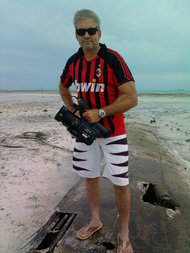 Matthew Hausle Steven C. Barber is the director of “Until They Are Home.”
Matthew Hausle Steven C. Barber is the director of “Until They Are Home.”
SANTA MONICA, Calif. — Steven C. Barber, filmmaker, was looking at a used Lexus to replace his 2001 Chevy when the Academy of Motion Picture Arts and Sciences released its lists of Oscar-eligible scores and songs this month. The music from his documentary, “Until They Are Home,” made both.
So who needs a Lexus? Mr. Barber, who operates from a rent-controlled apartment here, bought a full-page “for your consideration” ad in Variety instead.
The ad, said Mr. Barber, who spoke by telephone last week, cost him a little less than its standard price of $13,500. As with almost everything related to his movies, he haggled — but at least he didn’t ask Variety for a contribution.
“I ask everyone for money,” said Mr. Barber, who describes himself as a salesman by nature. In fact, he makes a living by selling advertising when he isn’t pursuing his passion for documentary films, and especially those about repatriating the remains of American military personnel who died abroad.
“Until They Are Home” is a sequel to Mr. Barber’s 2009 film “Return to Tarawa: The Leon Cooper Story.” Both films examine the battle for Tarawa, an atoll where in 1943 more than 5,000 Americans and Japanese died, most on the island of Betio, which is smaller than Central Park.
The new movie is about a United States military mission — inspired by the first film — to reclaim the bodies left behind. T. Boone Pickens and Ted Leonsis, said Mr. Barber, are among the wealthy supporters who contributed to the film’s roughly $300,000 budget.
The country singer Clint Black contributed a song, “She Won’t Let Go.” The composer Jamie Dunlap, known for his work on “South Park,” was paid for a score. And Mr. Barber got them qualified for Oscar consideration by doing what most ambitious documentarians do — spending still more money.
For starters, it cost about $18,000, he said, to have the movie shown for a week in one theater each in New York and in Los Angeles, with accompanying ads in The Village Voice and The Los Angeles Times.
Conversion of the film to a specified digital format, another Oscar requirement, cost an additional $3,000. It took about $400 more to make some 200 DVDs for distribution to documentary branch members, who did not put the film on their short list of 15 contenders.
But Mr. Barber hedged his bets by filling out some extra paperwork for the group’s music branch. Hence, Mr. Black’s song became one of 75 that are being considered for nominations, while Mr. Dunlap became one of 104 official contenders in the best score category.
If they are nominated, Mr. Barber is confident he can raise more money, to be used for a film about repatriating remains from the Philippines. As for the Variety ad, he figured, it was worth a used Lexus.
“I’ve got to roll the dice,” he said, “and make it look like I’m bigger than I am.”
Article source: http://mediadecoder.blogs.nytimes.com/2012/12/30/a-documentary-maker-puts-money-on-an-oscar-ad/?partner=rss&emc=rss